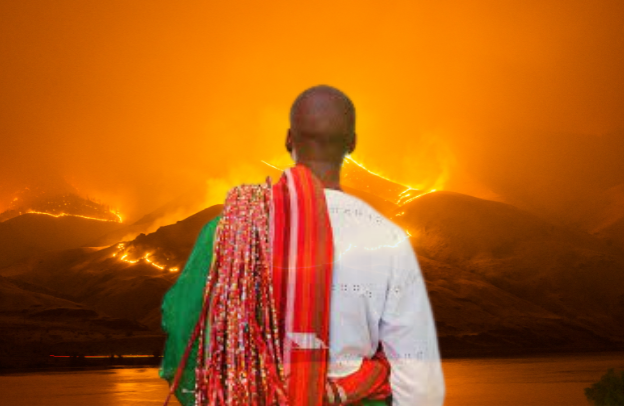Exploring the Igue Festival: A Sacred Celebration of Thanksgiving and Renewal in Benin, Nigeria

The Igue Festival is one of the most significant cultural celebrations among the Ẹdo people of Nigeria. Held every December, this annual festival serves as both a thanksgiving and renewal ritual that unites the people of Benin in gratitude for the past year and hope for the future.
Learn with AClasses Academy and improve yourself and your business skills.
It is a time for the Oba (king) and his people to come together in reverence, purification, and prayers for peace and prosperity in the year ahead.
A Rich History Rooted in Tradition
The origins of the Igue Festival trace back to the 14th century, during the reign of the legendary Oba Ewuare I, who ruled Benin from 1440 to 1473. It was during his youth, as a prince fighting to claim the Benin throne, that he earned the name Prince Ogun.
His experiences on the battlefield shaped his vision for the kingdom and laid the foundation for what would become one of Benin’s most iconic celebrations.
However, the festival as we know today was further shaped by the vision of Oba Akenzua II. Seeking to accommodate the growing movement of people and the evolving cultural landscape, he expanded the Igue Festival into a multi-day celebration.
See also The Power of Diaspora: How Cultural Tourism is Shaping the African Diaspora’s Connection to Heritage
Under his leadership, the Igue Festival evolved into a grand amalgamation of various rites, rituals, and ceremonies, becoming a terminal celebration that incorporates other significant festivals of the Benin people.
Today, the Igue Festival is not only a time of thanksgiving and spiritual renewal, but also a vibrant showcase of Benin’s rich cultural heritage.
It’s important also to note that the festival’s roots are intertwined with the reverence for the Oba’s spiritual power and leadership, as well as the historical importance of the monarchy in shaping the kingdom’s fortunes.
Tradition holds that the Igue Festival first began with a grand thanksgiving for the blessings the Oba and his people received throughout the year, and it has remained a central part of the Benin Kingdom’s cultural fabric ever since.
In fact, the Igue Festival is more than just a simple ritual; it is a dynamic celebration of life, renewal, and ancestral honor. Through rituals and ceremonies, the people of Benin demonstrate their deep connection to the spiritual realm and their respect for the legacy of their rulers.
The Role of the Oba in the Festival
The Igue Festival centers around the Oba, who is seen as both a spiritual and temporal leader. His wellbeing is believed to directly affect the prosperity of the kingdom, making his participation in the festival vital.
The role of Oba during Igue is both ceremonial and symbolic, emphasizing his power, his connection to the divine, and his role in guiding his people.
You might also like to see The Power of Your Book 2024: Celebrating African Storytelling and Literary Heritage
It is during this time that the Oba enters a period of seclusion known as Aguẹ, where he refrains from contact with the outside world as a way of purifying himself and preparing for the New Year.
During the festival, the Oba performs various important ceremonies to honor his ancestors, reaffirm his kingship, and invoke blessings for the kingdom. The most significant of these is the Iguẹ Ọba ceremony, in which the Oba and his chiefs pay homage to the ancestors, followed by a cleansing and fortification ritual.
The festival culminates in the Ugie Ẹwerẹ, where the people of Benin present the Oba with Ebe Ẹwerẹ (a symbol of joy and peace) as a way of ushering in the New Year with good wishes and blessings.
Since we’ve mentioned the period of seclusion known as Aguẹ, it’s important to highlight a significant historical event that occurred during this time—the British invasion of Benin in the late 1800s.
This invasion, which disrupted many of Benin’s sacred traditions, including the Igue Festival, remains a pivotal moment in the kingdom’s history. The British disruption of the festival during this period is a powerful reminder of the resilience of the Benin people and the festival’s enduring cultural significance despite external challenges.
This part of the article is particularly emotional for me, as it speaks to the deep connection I have with my ancestors and the devastating impact the British Empire had on our cultural values. The destruction of our heritage during the invasion is a painful chapter in our history that still resonates with me today.
The British invasion of Benin in the late 1800s
The British invasion of Benin in 1897 represents a dark chapter in the kingdom’s history, marked by the violation of its sovereignty, culture, and territorial rights.
This period, as detailed in the publication “Igue Festival and the British Invasion of Benin 1897: The Violation of a People’s Culture and Sovereignty” by Charles O. Osarumwense from the Department of History and International Studies, University of Benin, offers a profound look into the clash between British imperialism and the sacred traditions of the Benin Kingdom.
Before the invasion, the Benin Kingdom was a thriving sovereign state in pre-colonial West Africa, with a well-structured political, social, cultural, and economic system. Its political autonomy was evident in its internal governance, while its external affairs were carefully coordinated to maintain peace and prosperity.
One of the most remarkable aspects of Benin’s culture was the Igue Festival—a time of spiritual cleansing, prayer, and reflection that was integral to the kingdom’s rhythm.
During this sacred period, the Oba (king) would enter a state of seclusion, performing rituals to honor departed ancestors and seek divine blessings for the land’s continued growth and protection.
The Igue Festival as already discussed was an uncompromising spiritual observance, and its timing and practices were sacred to the Benin people. It was during this sacred period in 1897 that the British attempted to force a visit to the Oba.
This intrusion into a sacred time was met with firm refusal from the Oba, who understood the significance of the period and could not allow foreign interference. The British, however, insisted on proceeding with their visit, and this led to a tragic confrontation. The ambush and killing of British officers in Benin marked the beginning of the British invasion.
The incident sparked a series of events that culminated in the British military’s brutal attack on Benin City in February 1897. The invasion, which resulted in the looting of Benin’s royal artifacts and the destruction of many cultural treasures, was not only a military assault but a violation of the kingdom’s sovereignty and its deeply held cultural practices.
The British justified their actions under the guise of enforcing a treaty, the Gallwey Treaty of 1892, which had been signed between the Benin Kingdom and Britain for trade relations.
However, Osarumwense argues that the treaty was deeply flawed, and the imposition of British interests upon the Benin people, especially during such a culturally and spiritually significant time as the Igue Festival, was an outright violation of Benin’s territorial rights and cultural autonomy.
The British invasion of 1897, therefore, stands as a stark example of colonial powers disrespecting and undermining the traditions, sovereignty, and spiritual practices of African nations.
The violation of Benin’s cultural and territorial rights during the Igue Festival equally highlights the lengths to which colonial powers went to assert control over the people and their land. It was not only a military conquest but a cultural assault that sought to dismantle the very fabric of Benin’s identity and traditions.
This historical event serves as a powerful reminder of the importance of cultural preservation and the sovereignty of nations.
For the people of Benin and those of African descent globally, the invasion of 1897 remains a significant symbol of resistance against the forces that sought to erase African cultures and identities.
See also Esan Cultural Events And Festivals
As we reflect on the significance of the Igue Festival today, it’s crucial to remember the resilience of the Benin people and their unwavering commitment to preserving their cultural heritage, even in the face of colonial oppression.
Now, the rituals, let’s talk about the rituals during Igue festival.
Rituals and Ceremonies: A Sacred Tradition
The Igue Festival is not just a celebration of joy; it is a sacred event steeped in rituals that reinforce the spiritual connection between the Oba, the land, and the people. The festival spans several days, each marked by significant ceremonies:
- Aguẹ: A period of fasting and seclusion for the Oba and his chiefs. This is a time for deep reflection, spiritual purification, and preparation for the coming year. During this time, no funerals or burials can take place, as the focus is on thanksgiving and spiritual renewal.
- Ugie Irọn: A re-enactment of the Oba’s victory over his enemies, symbolizing resilience, strength, and the overcoming of adversity. This ceremony highlights the power of the monarchy and the enduring spirit of the Benin Kingdom.
- Ugie Erha’Ọba: A solemn ceremony honoring the Oba’s ancestors, especially the father of the reigning Oba. During this ceremony, the king dresses in ceremonial regalia and dances in honor of his father, showcasing the connection between past and present leadership.
- Iguẹ Ọba and Igue Ivbiọba: These ceremonies involve paying homage to the ancestral kings and fortifying the reigning Oba. It is a time of spiritual renewal, with dances, prayers, and rituals that strengthen the Oba and prepare the kingdom for the year ahead.
- Ugie Ẹwerẹ: The final ceremony, where the Oba and his people are presented with Ebe Ẹwerẹ, symbolizing joy, peace, and new beginnings. The festival culminates in the celebration of the entire Benin community, with vibrant festivities and traditional fireworks.
Celebrating the Igue Festival from Afar
While the Igue Festival is deeply rooted in Benin City, its significance transcends geographic boundaries. For those in the African diaspora, the festival serves as a powerful reminder of ancestral heritage and cultural pride.
As global interest in African heritage continues to grow, the Igue Festival offers an opportunity to reconnect with the rich traditions and customs of the Benin Kingdom.
For those unable to attend the festival in person, there are ways to participate virtually and celebrate the spirit of Igue. From live-streamed events to digital documentaries, you can learn about the festival’s rituals and ceremonies from afar.
See also Harnessing the Power of African Diaspora Heritage for Positive Change
Joining online communities focused on African heritage or hosting small gatherings to celebrate the festival’s themes of thanksgiving and renewal can also serve as meaningful ways to engage with the traditions of the Igue Festival.
Why the Igue Festival Matters Today
The Igue Festival is more than just a ceremonial event. It is a celebration of life, a reaffirmation of community, and a powerful reminder of the importance of spiritual renewal.
The themes of thanksgiving, renewal, and prosperity resonate deeply with the challenges and triumphs of our own lives, whether we live in Benin City or abroad.
By reconnecting with festivals like Igue, the African diaspora can preserve important cultural practices, celebrate heritage, and ensure that these traditions are passed on to future generations.
The Igue Festival reminds us of all the value of coming together in gratitude, reflecting on the past year, and hoping for a better, more prosperous future. Whether you are from Benin or part of the global African community, Igue offers an opportunity to honor the past, celebrate the present, and prepare spiritually for the new year ahead.
Conclusion – Celebration of Thanksgiving and Renewal in Benin, Nigeria
The Igue Festival is a sign of the enduring cultural practices of the Benin people, rooted in deep spiritual beliefs and centuries-old traditions. It is a time for thanksgiving, reflection, and renewal, where the Oba and the people come together to honor their ancestors and pray for prosperity in the coming year.
For those of African descent in the diaspora, the Igue Festival offers an opportunity to reconnect with their heritage and celebrate the shared values that bind us all.
Whether participating in person or virtually, the Igue Festival is a vibrant, living celebration that continues to unite, strengthen, and inspire.
Learn with AClasses Academy and improve yourself and your business skills.





